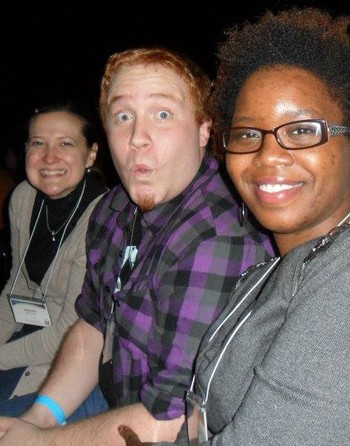When Lake Forest College students Sarah Brune and Cleo Hehn walked across the street to First Presbyterian Church of Lake Forest, in a suburb north of Chicago, the congregation had no collegiate ministry.
Ironic, considering First Presbyterian leaders had founded the college in 1857, with the congregation maintaining strong ties to it for over a century.
“It was in our DNA to be visible on the college campus,” says Jennifer Aycock, the church’s collegiate ministries director. “Then the 1960s happened, and the college moved away from its Presbyterian identity.”
First Presbyterian still made efforts to reach students. Over time fewer and fewer showed up for worship.
Then Sarah Brune, who grew up Lutheran, showed up. “I didn’t have a car, so I walked across the street to First Pres.,” says Brune. “I’ve been going there ever since.”
Later that year, Brune brought along roommate Cleo Hehn, who describes herself as a “none.” “My dad was atheist, my mom believed in love,” she says. “I came because Sarah invited me.”
Brune and Hehn decided to join the choir. Once they had made a commitment to practice with the choir for two hours a week and sing at one of the services on Sunday, intergenerational relationships began to form.
“We joke now that we have 50 grandparents,” says Hehn. “They were incredibly generous with us in a very uncertain time,” adds Brune. “We’d go to their houses for Easter, they’d give us free food.”
Both girls laugh now at their memories and marvel at how the church impacted them—which eventually would impact even more lives.
“Brune and Hehn’s presence in the church awakened in the church a desire to reengage in collegiate ministries,” says Aycock.
First Presbyterian hired Aycock as a seminary intern in 2011—two years after Brune and Hehn showed up—wanting to see if it could build off this energy by developing a collegiate ministries program. Aycock began by strengthening the relationships the church already had on campus. She then met with additional students and members of the administration and faculty, which led to First Presbyterian having a more visible presence on campus.
In the fall of 2012, the church set up a table alongside all of the student clubs at the college’s annual organization fair, handing out free bags of cookies, tea, USB lanyards, and a Gospel of John.
New student April Tosado Pagan approached the table, blurting out: “I’m not part of any religion. I really don’t know what to believe. I’m holding tightly to what I believe, but I want to let go.”
After exchanging emails and phone numbers with Aycock, she left feeling “empty and confused.” Her image of God was so negative, that God is angry and punishing. She wondered, “Why are these church people so nice, even giving me goodies, free food?” It didn’t fit with her false narrative of God.
After email and phone conversations, Aycock and Tosado Pagan met for coffee.
“I told Jennifer how I believed God was angry with me, that God was always going to punish me,” says Tostado Pagan. It’s what she had been told by her grandmother, a belief reinforced by messages taught in churches she attended as a little child. “When I told Jennifer I didn’t know what else to believe, she began to read Scripture to me that spoke about God’s goodness and how God loved us immensely through the gift of Jesus Christ. It felt like such a relief, like I’d discovered something new. Then she asked me to pray, which I’d never really done before with anyone. That’s when I began to cry.”
Tosado Pagan was so “overjoyed” that she immediately started going to a weekly Bible study on campus and to first@5, First Presbyterian’s Sunday night service that features worship, dinner, and fellowship.
“I was telling all my college friends my story,” says Tosado Pagan. “We all started to go to church together. The people there have been so accepting of us, regardless of whether we have faith, or don’t have faith, or have a different faith. I thank God every day: without them I wouldn’t be the person I am now becoming.”
Aycock says stories like April’s are “a highlight” in the midst of the church’s “mustard-seed endeavor” on the campus. Through worship, small groups, coffee conversations, mission trips, and relationships with church members, many students—like April—are asking questions about what they have believed about God and religion.
“So many students have never just been genuinely loved in the way that God loves us, in the way God calls us to love our neighbor,” says Aycock.
“They are discovering God wants a relationship with them, that it’s possible through Jesus Christ. It’s pretty radical, and it’s a game changer when a church welcomes students in a way that makes a relationship with God even desirable.”
Editor’s note: What's happening at First Presbyterian of Lake Forest is exactly what the Presbyterian Mission Agency’s new network of collegiate ministries, UKirk (meaning “university church”), is all about.

